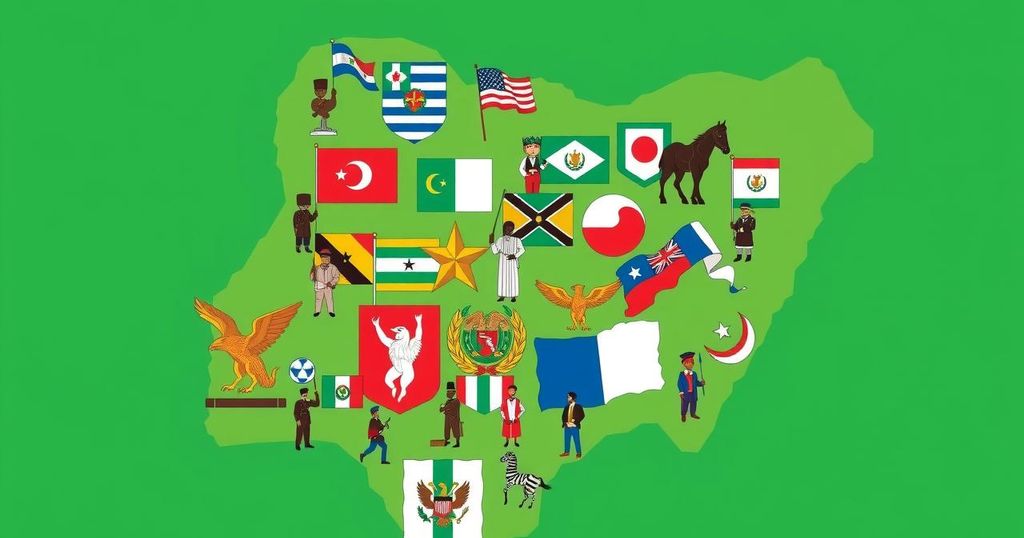Nigeria’s Political Shift: The Emergence of a De Facto One-Party State

Nigeria’s political scene is leaning towards a de facto one-party state dominated by the APC. Once a multiparty democracy with various active parties, it is now marked by significant defections and internal struggles within opposition parties like the PDP and Labour Party. This prevailing situation raises concerns about Nigeria’s democratic health and calls for a focus on effective governance regardless of the party structure.
Nigeria’s political landscape is seeing major shifts, leading some to argue it’s devolving into a one-party state. Officially, the political scene kicked off in 1923 with Herbert Macaulay’s Nigerian National Democratic Party, following the Clifford Constitution the previous year. Over the years, numerous parties emerged, including the National Council of Nigeria and the Action Group, marking Nigeria as a traditional multiparty democracy. However, current dynamics are raising concerns.
The Independent National Electoral Commission lists 19 registered political parties today, yet many observers claim the country is slipping into a state dominated by the All Progressives Congress (APC). A one-party state doesn’t always imply the existence of only one political party, as exemplified by the example of China. Rather, it describes a political atmosphere where one party dominates, overshadowing others.
Legally, Nigeria maintains a multiparty democracy, but practically, it’s increasingly resembling a one-party system. This is mainly due to the extensive defection of politicians from opposition parties to the APC. The remaining parties lack the strength to mount substantial electoral challenges. Ironically, this is reminiscent of the period from 1999 to 2015 when the Peoples Democratic Party (PDP) was similarly dominant and opposition parties were often viewed as afterthoughts. From a high of 91 parties in 2011, only 19 remain after a series of deregistrations by INEC.
Despite claims of a two-party system in democracies like the US or UK, they are more accurately multiparty democracies. In the US, for instance, while the Republican and Democratic Parties dominate, there are numerous other parties. The UK also has multiple influential parties beyond Labour and Conservative. Ghana, too, showcases a mixed bag of 15 registered parties ahead of its 2024 elections, yet two key players dominate.
Since the inception of the current Fourth Republic in 1999, the PDP and APC have mathematically been the only parties to win presidential elections. The APC’s growing influence since 2015 has caused many in opposition to question the health of Nigeria’s democracy. While the APC is scrutinized for its consolidating power, many of these woes fall back on the opposition themselves.
Intra-party strife has plagued opposition groups, especially the PDP, which has struggled with leadership turmoil since its defeat in 2015. After several chairmen over the years, the party looks set for yet another internal election later this year, following Dr. Iyorcha Ayu’s departure post-2023 defeat. The Labour Party also faces challenges, and the New Nigeria Peoples Party is embroiled in its own disputes.
If Nigeria is to revive its multiparty status, opposition parties will need to curb these internal conflicts. The APC’s formation itself demonstrates how cooperation is essential in creating a unified front against a stronger foe. Recent defections have further illustrated the instability within the opposition.
Now critics argue that the APC uses resources and legal pressures to incentivize defections, although there’s little evidence to support this. Historical cases show that former politicians haven’t always switched parties for fear of legal troubles, as many ex-opposition members found success in their own parties despite challenges from APC. Defections can stem from a host of issues, often reflecting deeper intra-party crises rather than a simple desire for power.
The critique of Nigeria’s political system as either de facto or de jure one-party state raises a significant question: what does this mean for governance? Good governance surely transcends the formalities of political party structures. Comparatively, China operates as a one-party state yet leads in economic advancements. Nigeria grapples with a myriad of challenges, from rampant corruption and insecurity to poverty. Ultimately, the focus should be on achieving a system that provides substantial socio-economic welfare for all citizens, regardless of the underlying party framework.
In summary, Nigeria’s political environment is leaning heavily towards a situation that many classify as a one-party state, primarily due to the dominant status of the APC and the issues faced by opposition parties. While Nigeria is legally a multiparty democracy, the practical implications suggest otherwise. The problems stemming from internal strife within the opposition parties are not insignificant, and until they can resolve their leadership crises, the current state is likely to persist. The core need remains good governance, no matter the political structure in place.
Original Source: punchng.com







